The Breakfast Club Blu-ray Movie
HomeThe Breakfast Club Blu-ray Movie 
25th Anniversary EditionUniversal Studios | 1985 | 97 min | Rated R | Aug 03, 2010
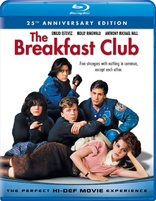
Movie rating
8.1 | / 10 |
Blu-ray rating
| Users | 3.7 | |
| Reviewer | 4.0 | |
| Overall | 3.8 |
Overview
The Breakfast Club (1985)
Five high school students meet in Saturday detention and discover they have a lot more in common than they thought.
Starring: Emilio Estevez, Paul Gleason, Anthony Michael Hall, John Kapelos, Judd NelsonDirector: John Hughes
| Comedy | Uncertain |
| Teen | Uncertain |
| Coming of age | Uncertain |
| Drama | Uncertain |
Specifications
Video
Video codec: VC-1
Video resolution: 1080p
Aspect ratio: 1.85:1
Original aspect ratio: 1.85:1
Audio
English: DTS-HD Master Audio 5.1 (48kHz, 24-bit)
French: DTS 2.0
Subtitles
English SDH, French, Spanish
Discs
50GB Blu-ray Disc
Single disc (1 BD)
BD-Live
Playback
Region free
Review
Rating summary
| Movie | 4.0 | |
| Video | 3.5 | |
| Audio | 4.0 | |
| Extras | 4.0 | |
| Overall | 4.0 |
The Breakfast Club Blu-ray Movie Review
"Don't you forget about me," goes the song, and few in the right demographic who saw this film 25 years ago have forgotten 'The Breakfast Club'.
Reviewed by Jeffrey Kauffman July 28, 2010One of the more amusing, albeit morbid, parlor games film fans play every year is the annual Oscar “In Memoriam” contest of who will get mentioned and who will get the loudest applause. This quasi-sporting event hasn’t quite risen to the heights of brackets in the Final Four, but I personally know several people who wager rather significant sums of money on various aspects of this odd tradition. Of course this past year raised the hackles of many folks when Farrah Fawcett (not to mention Bea Arthur) got left out of the film clip parade, but I personally have long been more interested in the audience reaction levels as deceased people who are (to me, anyway) film icons receive what could only charitably be termed a smattering of applause. How can someone who has contributed as much to filmmaking as the late cinematographer Jack Cardiff not be greeted with a thundering ovation? Quite easily, evidently. What made this past year’s Oscar funeral bash even more controversial, at least to those with a curmudgeonly side, was the perhaps unusual decision to grant director John Hughes, who had passed away unexpectedly from a heart attack at the relatively young age of 59, his own segment, featuring several once-household names he had helped elevate to stardom. While some Hughes alumni are still in the public eye (Matthew Broderick and Jon Cryer, for example), others perhaps more forgotten were also in attendance. There in front of adoring millions were Ally Sheedy, Molly Ringwald, Macaulay Culkin, Anthony Michael Hall and Judd Nelson, making brief comments about what Hughes had meant to them personally and professionally. It may have seemed peculiar to those significantly beyond the vaunted 18-49 demographic, but for those born from the mid-1970’s on, it probably was a perfect way to remember a filmmaker who captured the 1980’s zeitgeist as few others. Though Hughes’ cultural impact trailed off precipitously in the 1990’s, for a rather longish “brief” shining moment from 1984’s Sixteen Candles on, he was a writing-directing force to be reckoned with, regularly churning out films that were critically well received (or at least generally tolerated) while raking in huge box office receipts. One of Hughes’ best remembered and most beloved efforts was his follow up to Candles, 1985’s The Breakfast Club, a film which made detention seem cool, and which established several then up-and-comers as new film stars, whom a magazine writer soon dubbed (along with other actors the same age, like Rob Lowe) "The Brat Pack".
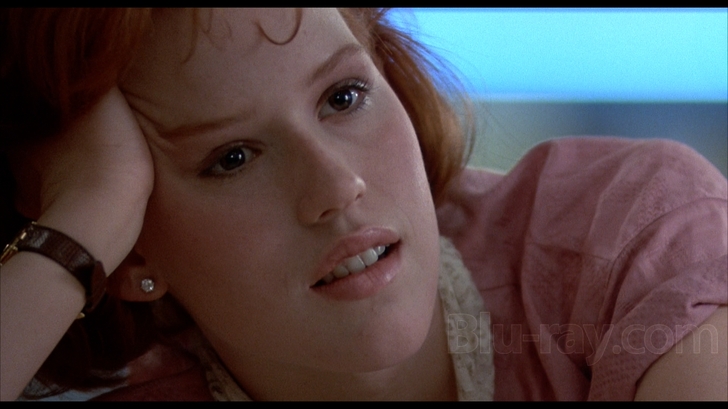
Molly Ringwald as "nice girl" Claire Standish.
If some of Hughes’ other megahits could rightfully be seen as live-action cartoons (Home Alone springs instantly to mind, for example), what set The Breakfast Club apart and probably helped it to become such a touchstone for younger audiences of the day was how real it felt, despite its artifices. While Hughes doesn’t shy away from presenting us types rather than actual characters, he’s smart enough to dig beneath the surface as the film progresses to at least shade things with some degree of emotional truth. Therefore, during these five disparate characters’ Saturday detention, typically oil and water combinations like the jock (Emilio Estevez) and the nerd (Anthony Michael Hall) and the popular girl (Molly Ringwald) and the proto-emo quasi-nutcase (Ally Sheedy) find they have more in common than they initially think. Only Judd Nelson’s neo-James Dean take as a rebel without a clue seems too stereotypical (with an expected emotional about face) for its own good. All of these young actors manage to create believable characters, though, despite the occasional missteps of Hughes’ screenplay.
Despite its professionalism, the question remains when viewing the film from 25 years on, what was it exactly which caught the young audience’s fancy so convincingly and made The Breakfast Club not just a sizable hit on its own terms, but vaulted it into “template” status for similarly themed films which followed in its wake? When viewed through the jaundiced eye of all that’s come afterward, it has to be admitted that there’s really nothing overtly remarkable about this film. It features cookie cutter characters, Hughes’ typical disdain for the “grown ups” (something which recurs regularly in almost all of his films), and some patently trite dialogue and character development. The answer, as perhaps unsatisfying as it may be, may simply come down to a matter of timing. The 1950’s saw a similar reaction to Rebel Without a Cause, which seemed to magnetize the youth of the day and which led to virtually a decade long film love affair with (as it was so quaintly termed back then) “juvenile delinquency.” The 1960’s and 1970’s slowly became counter-cultural to such a degree that “delinquency” almost became the norm (in films as varied—at least subject-wise if not in tone—as Easy Rider and M*A*S*H), something that failed over time to deliver the emotional wallop it once had. This trend had fallen by the wayside by the early to mid-1980’s, so that when Hughes revisited it, it seemed startlingly fresh and revelatory, despite the musty smell lingering just beneath the surface.
And yet ultimately the very real pleasures of The Breakfast Club simply can’t be denied. Hughes had an inerrant ear and eye for the emotional turmoil of teens, and he brings that unfailing accuracy to The Breakfast Club at the very least to its overarching impact, if sometimes not to individual moments. There’s also an appealingly visceral, stripped-bare emotionalism to most of these performances, especially Sheedy, who seems at times ready to implode from the emotional weight on her shoulders. Also, the slow but steady progression from isolation into community is perhaps this film’s greatest lasting legacy, and one of the more potent, if perhaps subliminal, reasons the film appeals to younger folks so strongly. It manages to give hope to an age group that is frequently on the outs with both their elders and their peers that reconciliation and relationships are indeed possible. That depiction of camaraderie forged by trial has the devastating ring of truth in The Breakfast Club, and it no doubt serves as a clarion call to disaffected youth everywhere.
The Breakfast Club Blu-ray Movie, Video Quality 
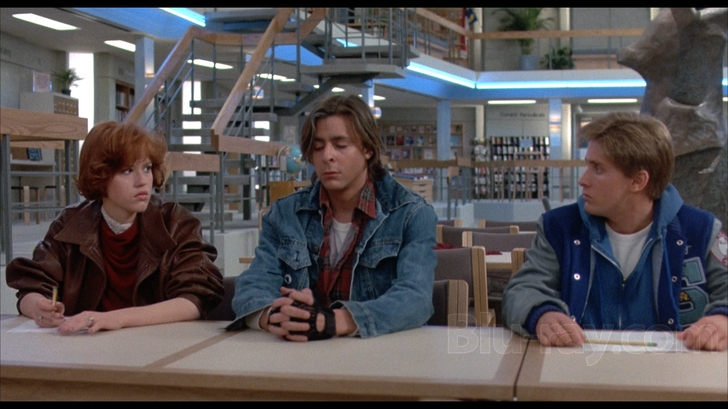
The Breakfast Club arrives on Blu-ray with a VC-1 encoded 1080p transfer in a 1.85:1 aspect ratio. While sharpness in noticeably better than on previous home video releases, the source elements for this film still belie its less than blockbuster budget. This was one of A&M Films' first forays into co-production with a major studio (Universal), and there's a certain indie feeling to the whole production which unfortunately becomes a detriment to its video quality. Right off the bat there's noticeable telecine wobble throughout the opening credits, but perhaps more surprisingly, that wobble continues through several master shots in the film's opening moments. There are also a smattering of inartful edit jumps and splices, with moments of misframing. None of these issues can be attributed to the Blu-ray itself, but they will probably trouble the more persnickety viewers who may have expected some sort of major restoration for a release of this renown. On the whole, colors look very good to excellent, though nothing is overwhelmingly saturated. Grain is natural looking, giving The Breakfast Club an appealing texture. And while, as mentioned above, there is certainly an up-tick in sharpness (compare for instance the 480p version of the film included in the Hughes retrospective included as an extra), there's nothing here that screams "high definition." Fans of the film will probably be thrilled to have this film on Blu-ray and so will be more likely to overlook its video flaws, but those hoping for a digital restoration and something a bit more pristine are bound to be disappointed.
The Breakfast Club Blu-ray Movie, Audio Quality 
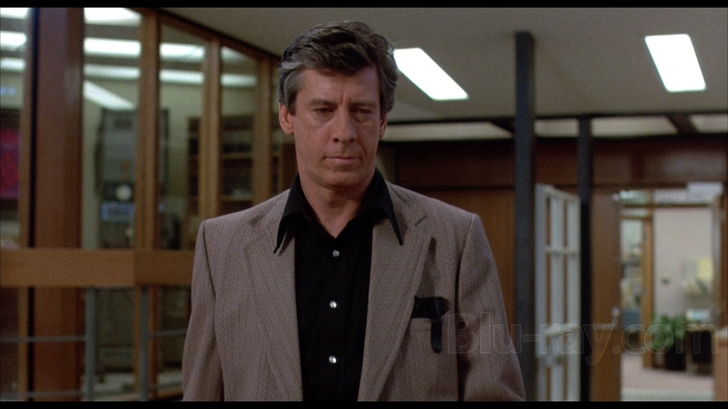
Considerably better, though with its own set of problems, is this film's lossless DTS-HD Master Audio 5.1 track. The best part of this mix is with the music cues, which are nicely bombastic and fill the surrounds quite invitingly. The opening kick drum of Simple Minds' "Don't You Forget About Me" thunks nicely through the subwoofer and Jim Kerr's plaintive voice sounds excellent. Somewhat more problematic is the dialogue, especially in Judd Nelson's voiceover which open and close the film, which sounds strangely muffled and boxy. Otherwise, this is a solid presentation, though not very immersive. Onscreen dialogue (whether looped or not) is clear and precise, and underscore and source music cues sound great. This is a fairly talky film, with few if any opportunities for surround magic, so with that in mind, The Breakfast Club's soundfield, while limited, is excellently rendered.
The Breakfast Club Blu-ray Movie, Special Features and Extras 
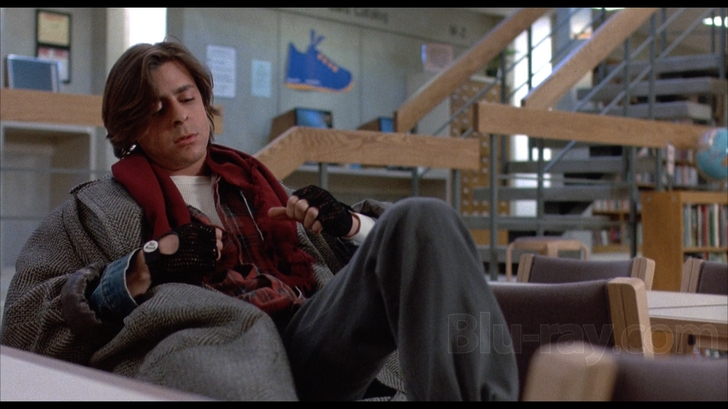
A good set of supplements is included on this Blu-ray, including a very informative Commentary by Judd Nelson and Anthony Michael Hall, where they discuss everything from working with iconic editor Dede Allen to becoming part of "The Brat Pack." Also on hand are two SD featurettes, the better of which is Sincerely Yours (51:25), a nice 12-part look back on the film, with in-depth segments on each of the characters. The film's lasting legacy is also explored, covering everything from Fast Times at Ridgemont High to Juno. Interesting also, though brief and a bit defensive (on the part of the actors), is The Most Convenient Definitions: The Origins of the Brat Pack (5:31), which talks about the New York magazine story which coined the term, and how it was both boon and bane to the young actors. The Theatrical Trailer rounds out the supplements.
The Breakfast Club Blu-ray Movie, Overall Score and Recommendation 
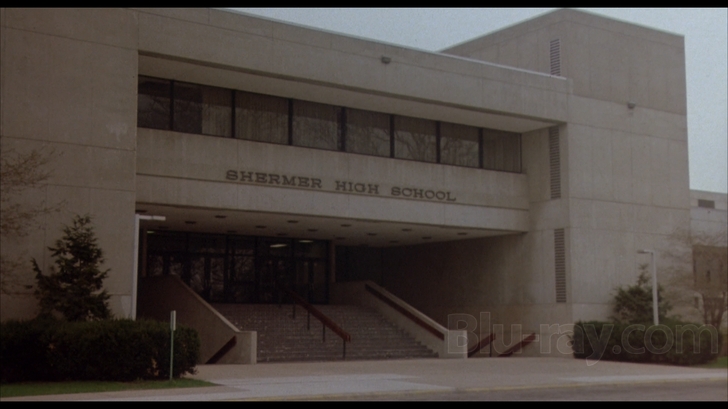
The Breakfast Club remains one of John Hughes' crowning achievements. It may be no ultimate masterpiece, but it caught the tenor of the times as few films of that era did. It's still fun to revisit these friends of yesteryear, and while their adventures may not seem quite as fresh or funny, the underlying emotions still ring very true. This Blu-ray has a couple of technical issues keeping it from an outright rave, but the film itself comes highly recommended.
Other editions
The Breakfast Club: Other Editions

The Breakfast Club
Universal 100th Anniversary
1985

The Breakfast Club
1980s Best of the Decade
1985

The Breakfast Club
30th Anniversary Edition | Remastered
1985

The Breakfast Club
30th Anniversary Edition
1985

The Breakfast Club
30th Anniversary Edition + Pitch Perfect 2 Fandango Cash
1985

The Breakfast Club
Pop Art | 30th Anniversary Edition Disc
1985

The Breakfast Club
Pop Art | 30th Anniversary Edition Disc | with Pitch Perfect 3 Fandango Movie Cash
1985

The Breakfast Club
1985

The Breakfast Club
1985

The Breakfast Club
30th Anniversary Edition
1985

The Breakfast Club
35th Anniversary Edition
1985

The Breakfast Club
1985

The Breakfast Club 4K
1985
Similar titles
Similar titles you might also like

Sixteen Candles
Remastered
1984

The DUFF
2015

Mean Girls 4K
20th Anniversary Limited Edition Packaging
2004

Fast Times at Ridgemont High
1982

Napoleon Dynamite
2004

Ferris Bueller's Day Off 4K
1986

Love, Simon
2018

Some Kind of Wonderful
1987

Not Another Teen Movie
Choice Collection
2001

Pretty in Pink 4K
1986

Adventureland
2009

Easy A
2010

Bring It On: All or Nothing
2006

Prom
2011

Freaks and Geeks: The Complete Series
New Widescreen Presentation
1999-2000

Struck by Lightning
2012

She's All That
1999

Drillbit Taylor
Extended Survival Edition
2008

Whip It
2009

Clueless 4K
30th Anniversary Edition
1995